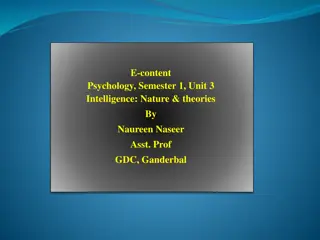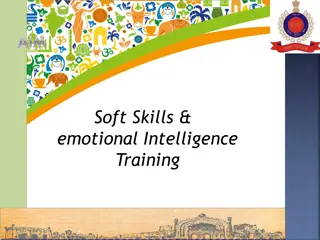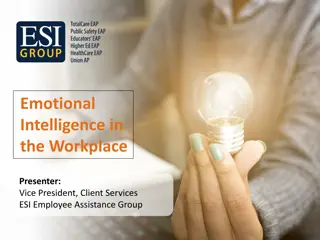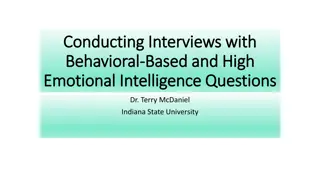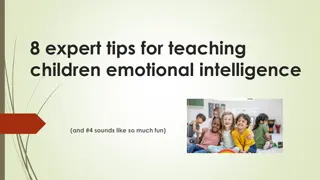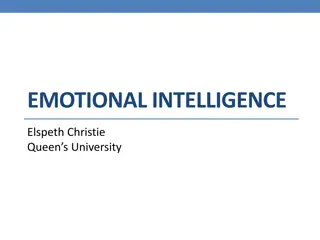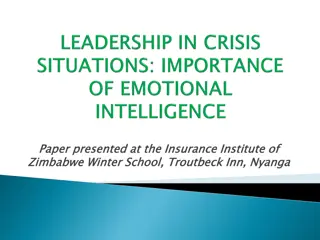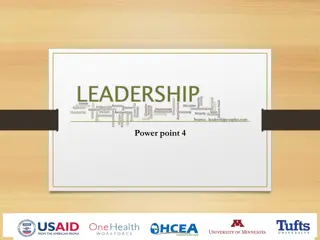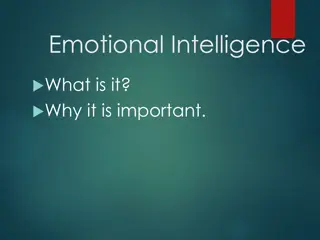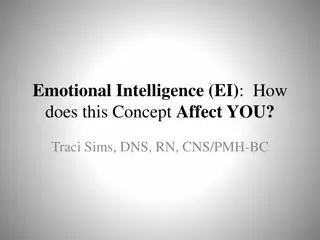Understanding Emotional Intelligence and its Impact on Leadership
Emotional intelligence, the capacity to be aware of, manage, and express emotions, plays a crucial role in effective leadership. Leaders with high emotional intelligence exhibit qualities like self-awareness, relationship skills, and self-confidence, enabling them to manage emotions effectively and influence others positively in both personal and professional settings.
Download Presentation

Please find below an Image/Link to download the presentation.
The content on the website is provided AS IS for your information and personal use only. It may not be sold, licensed, or shared on other websites without obtaining consent from the author. Download presentation by click this link. If you encounter any issues during the download, it is possible that the publisher has removed the file from their server.
E N D
Presentation Transcript
Emotional Intelligence IEEE Computer Society Adam Schmidt, PCC, PMP August 24, 2021 Proprietary - Smart Summit Coaching, LLC
Think of TWO great leaders you know personally and have worked with. What made them great leaders? What qualities did they possess? 2
What is Emotional Intelligence? Emotional intelligence is the capacity to be aware of, manage, and express one's emotions and to handle interpersonal relationships judiciously and empathetically. In practical terms, emotional intelligence is the awareness that emotions can drive our behavior and impact people (positively and negatively) and learning how to manage those emotions both our own and others especially when we are under pressure. A leader who exercises emotional intelligence uses good judgment and common sense. 3
The Four Domains of EQ Self Awareness Self Management Employing tools to counteract aggravation, uncertainty, and emotional triggers Harnessing your intuition and creativity Maintaining your resiliency in the face of pressure Knowing when you re emotionally triggered and how you react to stress, work demands and forced change Seeing the effects of your reaction on others at work and home Acknowledging your strengths and limitations Relationship Skills De-escalating conflict and resolving differences effectively Inspiring and influencing others Working collaboratively in teams Awareness of Others Tuning into where others are Showing empathy by sensing others feelings and perspectives Reading organizational currents accurately 4
Self-awareness is Your ability to accurately perceive your own emotions in the moment and understand your tendencies across situations. 5
Self Awareness Self- Confidence Self- Awareness Accurate Self Assessment Emotional Self- Awareness 6
Emotional Self-Awareness: Self-Confidence Attuned to inner signals recognizing how your feelings affect yourself and your job performance Attuned to your guiding values and can intuit the best course of action See the big picture in a complex situation Candid and authentic, able to speak openly about emotions or with conviction about guiding vision
Emotional Self-Awareness: Accurate Self-Awareness Know your own limitations and strengths Exhibit a sense of humor about yourself Gracefulness in learning Welcome constructive criticism and feedback 8
Emotional Self-Awareness: Realistic Self-Assessment Knowing your abilities to play to your strengths Acknowledge when emotions have overtaken rationality amygdala hijack Sense of presence and self- assurance to stand out in a group 9
Self-Awareness: What can I start doing, today? Notice. Recognize with compassion, not judgment. Emotions are automatic and signals from the body. Lean in. Rather than avoiding a feeling, move toward the emotion, into it, and eventually through it. Reflect.Ask yourself what s up with that? What is behind my reaction? How did I respond in the moment? 10
The Four Domains of EQ Self Awareness Self Management Employing tools to counteract aggravation, uncertainty, and emotional triggers Harnessing your intuition and creativity Maintaining your resiliency in the face of pressure Knowing when you re emotionally triggered and how you react to stress, work demands and forced change Seeing the effects of your reaction on others at work and home Acknowledging your strengths and limitations Relationship Skills De-escalating conflict and resolving differences effectively Inspiring and influencing others Working collaboratively in teams Awareness of Others Tuning into where others are Showing empathy by sensing others feelings and perspectives Reading organizational currents accurately 11
Self Management Self-Control Optimism Transparency Self- Management Initiative Adaptability Achievement
Emotional Self-Management: Self-Control Finds ways to manage disturbing emotions and impulses and channels them in useful ways Stays calm and clear-headed under high stress or during a crisis Remains unflappable even when confronted by a trying situation 13
Emotional Self-Management: Transparency Leaders that live their values An authentic openness to others about one s feelings, beliefs and actions allows integrity Openly admit mistakes or faults Confronts unethical behavior in others rather than turning a blind eye 14
Emotional Self-Management: Adaptability Can juggle multiple demands without losing focus or energy Comfortable with the inevitable ambiguities of organizational life Flexible in adapting to new challenges; nimble in adjusting to fluid change and limber in their thinking in the face of new data or realities 15
Emotional Self-Management: Achievement High personal standards that drive constant improvement Pragmatic, setting measurable and challenging goals Calculates risk so that their goals are worthy and attainable Continually learning and teaching ways to do things better 16
Emotional Self-Management: Initiative Internal drive have what it takes to excel and control their own destiny Seize opportunities or create them, rather than simply waiting Cuts through red tape; may even bend the rule when necessary to create better possibilities for the future 17
Emotional Self-Management: Optimism Rolls with the punches; sees an opportunity rather than a threat in a setback Sees others positively, expecting the best in them Sees the glass half-full expecting changes in the future to be for the better 18
Adam Schmidt, PCC, PMP Adam@SmartSummitCoaching.com (973) 908-1389 www.SmartSummitCoaching.com Proprietary - Smart Summit Coaching, LLC


